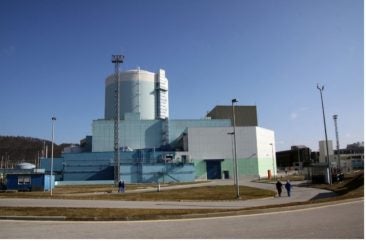
Slovenians will vote on 24 November in a consultative referendum on the construction of a new unit at the Krško NPP, according to a decision approved in a bi-partisan vote by the National Assembly.
The government and the opposition believe Slovenia should rely on a combination of nuclear and renewables for a stable supply during the transition away from fossil fuels. Expansion of nuclear capacities is seen as the most important long-term measure in the process.
The referendum vote will not be a final decision on a new reactor but on whether to give the government and the investor a mandate to continue their work on preparing the project. Prime Minister Robert Golob said the final decision may be adopted in 2027 or 2028.
In the meantime, Slovenia will have to invest over €100m ($109m) in research and human resources, therefore it is important to know whether the public sees a new nuclear reactor realistic, he told a discussion on nuclear energy in parliament the day before the vote and which was attended by International Atomic Energy Agency (IAEA) Director General Rafael Mariano Grossi, who was visiting Slovenia.
If the referendum is positive, Golob said his party will immediately submit a bill for construction of Krško 2. State-owned energy company Gen Energija, which owns the Krško NPP jointly with Croatia, has valued the Krško 2 project at between €9.3-15.4bn depending on whether the capacity is 1,000 MWe or 1,650 MWe. Minister of Environment, Climate & Energy Bojan Kumer said that a final decision on Krško 2 could be made in five years at the earliest. The building permit would take another four years, while construction would take seven years.
The opponents, including a number of non-governmental organisations and environmental campaigners, said the referendum is premature as there is not enough information for voters to make an informed decision, and would give the government a free hand to pursue the project. They have criticised the way the referendum question is framed, describing it as “suggestive and manipulative”. Voters will be asked whether they “support the implementation of the Krško 2 project, which will ensure a stable supply of electricity together with other low-carbon sources”.
Danijel Levičar, the state secretary in the prime minister’s office in charge of the national nuclear programme denied that the referendum represents a “carte blanche” for the project to go ahead. He said the investor and government need a mandate to prepare the paperwork, select a supplier, obtain a site licence, recruit staff and to start the siting process. He insisted that there is enough information available for voters to make an informed choice.
Grossi said Slovenia can be proud of its nuclear programme and should use its experience in deciding about future use of nuclear power. He sees the Krško power station as giving Slovenia an advantage over other countries who are only now starting to consider the use of nuclear.
The Krško plant is co-owned by Croatia’s Hrvatska Elektroprivreda (HEP) and Slovenia’s GEN Energija and generates some 40% of Slovenia’s electricity output. The 696 MWe Westinghouse pressurised water reactor, which is some 100 kilometres from the Austrian border, began operation in 1981. In 2015, a 20-year extension to its initial 40-year operational lifetime was approved. In July 2021, Slovenia’s Infrastructure Ministry issued a permit for the construction of a second unit at Krsko, but the decision faced opposition from Austria.






